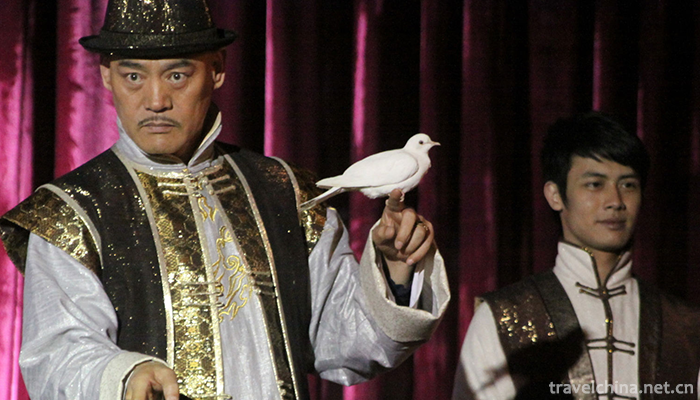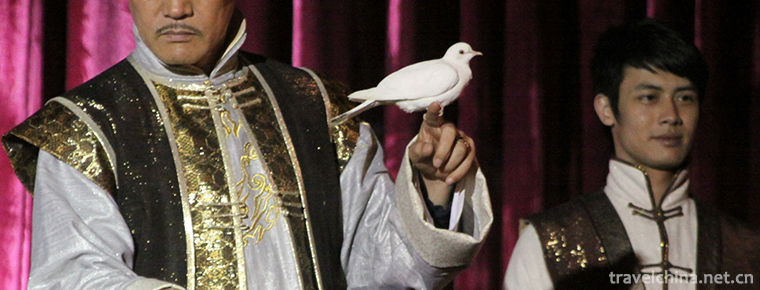conjuring tricks
conjuring;tricks
Conjuring tricks is one of the traditional Chinese acrobatics. Performers use agile methods to create audiovisual illusions, performing various objects, animals or water and fire and other rapid increase or decrease of hidden changes. China has a long history of juggling. According to Zhang Heng's "Xijing Fu" of the Han Dynasty, there were programs such as swallowing knives, spitting fire and painting ground into Sichuan as far back as the Han Dynasty.
Most of the props for tricks are daily necessities or production tools commonly used by the working people, such as pots, bowls, dishes, spoons, cages, boxes, cabinets, knives, etc.
On May 23, 2011, juggling was approved by the State Council to be included in the third batch of national intangible cultural heritage list.
Development
For thousands of years in ancient China, juggling has been a lasting folk art and a reflection of traditional Chinese culture.
Before the Qing Dynasty, artists performed in ancient costumes. In the Qing Dynasty, the performance of ancient costumes was banned by the Qing government. Since then, artists have been accustomed to wearing new long gowns and coats to perform. The costumes of jugglers follow this tradition, so artists who can see in modern times have been wearing coats to perform.
Prop
Most of the props of Chinese traditional tricks are daily necessities or production tools, such as pots, bowls, dishes, spoons, cages, boxes, cabinets, knives, etc.
technique
The trick is to "turn up and down, through diplomatic representation", which means that the gesture of handing over to the audience before the performance must be bright up, down, reverse and positive, and let the audience see Gabriel outside.
Colorful living
There are four sets of basic hand color work (i.e. hand skills) for "jugglers".
The trick is "Dan, sword, bean, ring". Dan is to swallow iron eggs, swords, swords, swords; beans, beans, beans picked by immortals (two bowls tied together seven gum beans, changing back and forth, no trace, no shadow in and out); rings, refers to nine continuous rings, the lead wire into nine iron rings, can be imagined as visible things, such as tricycles, official hats, flower baskets, lanterns and so on.
Distinguish
Modern so-called "magic" performance programs are mostly Western skills, belonging to foreign products, so the costumes of actors are suits or uniforms. Modern magic props originating in the West are unfamiliar to most audiences and are usually made of special features, such as magic sticks, magic guns, tin janes, magic vats, etc. The magic trick is "pull up with the upper finger and pull down with the left and right hand". When the actor lifts his finger upward and takes the opportunity to pull out the underlying things with the other hand, he calls it "pull down with the upper finger". When the actor shows the audience his left hand, he quickly pulls out the ambush with the right hand, which is called "pull up with the left and right hand".


-
2.Kaifeng soup dumplings
Kaifeng filling soup bag is one of the famous foods in Kaifeng because of its unique flavor. The soup is thin and white like Jingdezhen ceramics. It has a transparent feeling
Time 2018-11-26 -
3.Pagoda of Xing Jiao Temple
Hingjiao Temple Pagoda is located in the original Hingjiao Temple of Shaoling, Chang'an District, Xi'an Province, Shaanxi Province. It is a famous figure in the history of Buddhist communication
Time 2018-12-24 -
4.Huaian Government Office
Huai'an government office is located in Huai'an City, Jiangsu Province, which is a national AAAA tourist attraction. It is located in Dongmen Street, Huai'an District, the old city of Huai'an, north o
Time 2019-01-17 -
5.Pingxiang Xiangdong Nuo Mask
Nuo mask is an important part of Nuo culture. It is used in Nuo etiquette, Nuo dance and Nuo opera. Nuo mask in eastern Hunan is an excellent traditional Chinese sculpture with a long history. Eastern
Time 2019-06-09 -
6.Qin opera
Qin Opera, also known as Bangzi Opera, is a traditional drama in Northwest China and one of the national intangible cultural heritage.
Time 2019-06-10 -
7.Timago of Tujia Nationality
The Tujia Tima song, also known as the "Tujia Tima Goddess Song", is an ancient song sung in Tujia language in the activities of Tujia Tima. It mainly distributes in Longshan, Yongshun, Baoj
Time 2019-06-23 -
8.Wunijing Handmade Cotton Textile Technology
Wunijing handmade cotton textile technology has a very long history in China. Cotton and hemp textiles first appeared in the Neolithic Age. The handmade cotton textile technology in the Tang Dynasty w
Time 2019-06-29 -
9.Beijing Language and Culture University
Beijing Language and Culture University, established in 1962 under the personal care of Premier Zhou Enlai, is a university directly under the Ministry of Education of China. In June 1964, it was name
Time 2019-09-22 -
10.Anqing Normal University
Anqing Normal University (Anqing Normal University), abbreviation of Anqing Normal University (AQNU), is located at National historical and cultural city Anhui Province Anqing City It is directly subo
Time 2019-11-07 -
11.Deyang Sports
In 2017, Deyang City built 791 national fitness routes and 608 national fitness projects. At the end of the year, there were 10 public stadiums and stadiums, and the annual sales of sports lottery tickets were 160 million yuan.
Time 2020-12-14 -
12.Animal resources in Leshan
The composition of the wild fauna in Leshan City is located in the transitional zone between the Palaearctic realm and the Oriental realm. It is mainly composed of the southwest region and central China region of the Sino Indian subregion in the Oriental realm.
Time 2020-12-17